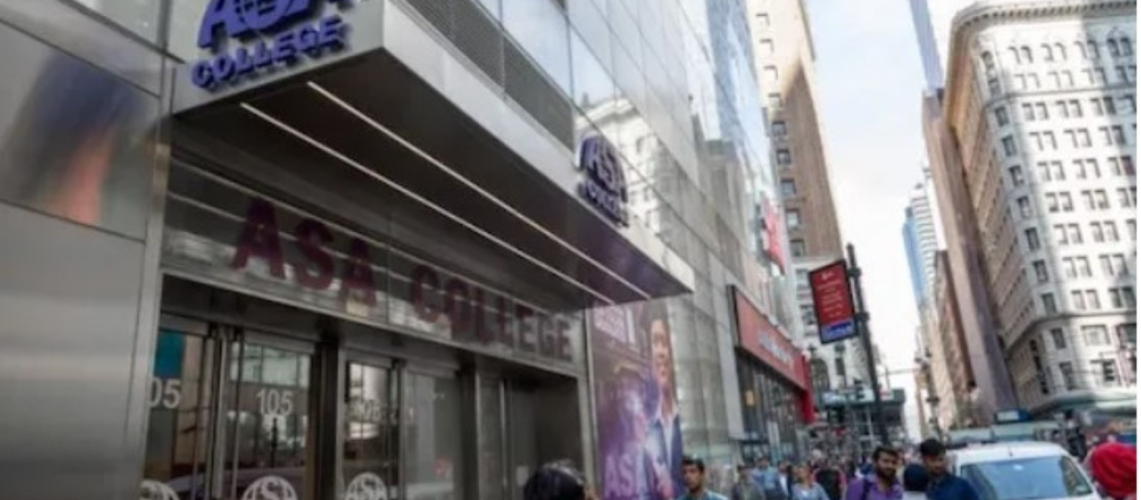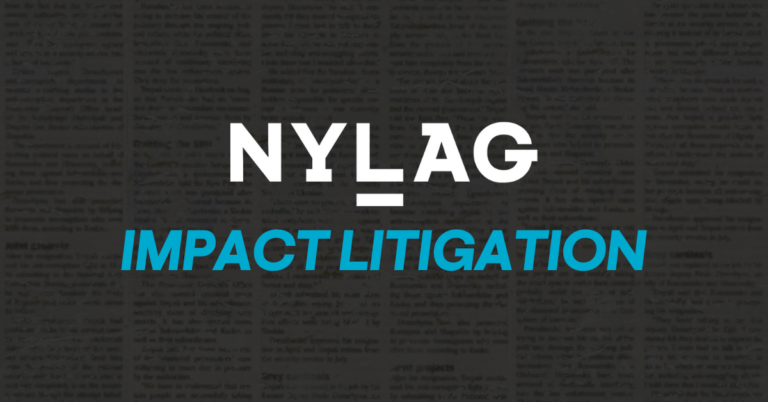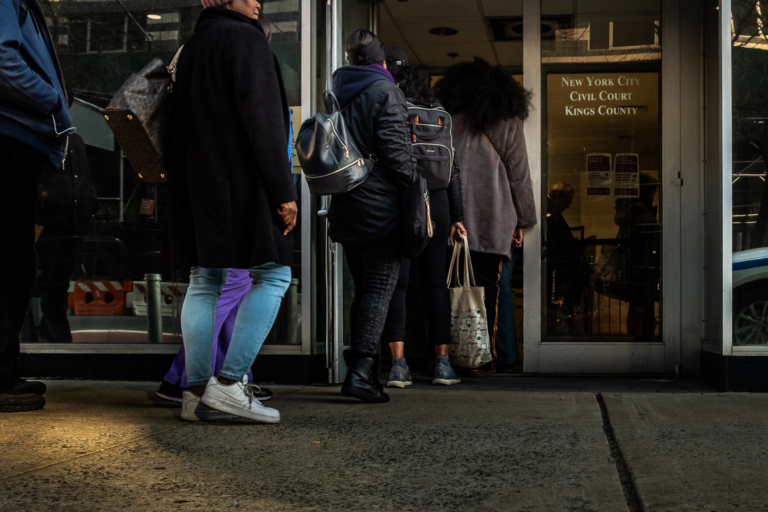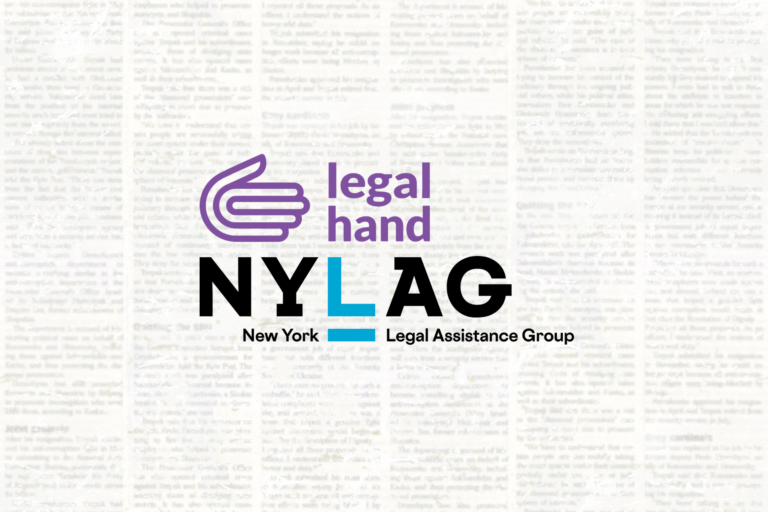David Halperin
The Republic Report
Faced with the increasing likelihood that it will be forced to shut down, New York-based for-profit ASA College has left students in turmoil, providing confusing messages about transfer options, refusing to refund tuition, adding new charges to student bills, and seeming to recruit and enroll new students even as it appears likely they will not be able to complete their studies at the school. ASA also has been failing to pay employees on time, leading to repeated confrontations between faculty and the school’s controversial owner, Alex Shchegol.
Jacaly Muranelli, who lives just outside New York Ciity, enrolled in ASA’s criminal justice program this fall, just weeks before the school lost its accreditation. “I could never imagine,” she says, “that an institution of higher education could conduct itself so unprofessionally, with zero compassion toward students.” “I really wish, says Muranelli, “I had looked into for-profit colleges and how they operate” before enrolling. She added, “Once they lock you in, you no longer matter.”
Accreditor Middle States Commission on Higher Education withdrew ASA’s accreditation on November 11, effective March 1. In a letter to the school, Middle States cited, among other things, ASA’s alleged failure “to demonstrate that it can provide a quality student learning experience.” Middle States also told ASA that if it continued to recruit and enroll new students, accreditation could be revoked even sooner.
Unless Middle States’ decision is reversed on appeal, ASA will lose access to the federal student aid that has made up almost two-thirds of its revenue.
ASA, with campuses in Manhattan and Brooklyn, New York, and Hialeah, Florida, has offered programs in nursing, health care, information technology, business, and criminal justice. It reported revenues in the 2020-21 academic year of $52 million, with $33.6 million of that total coming from federal taxpayers through student grants and loans.
Shchegol was forced out as the college president by his board three years ago amid allegations of egregious sexual misconduct. Last year, Shchegol ousted most of the school’s board members and regained control. But after the New York Daily News exposed the upheaval, and after Middle States last December placed the school on probation, Shchegol resigned again as president. He remains ASA College‘s owner. And some school employees say that, in fact, he has remained in charge of operations.
In October, ASA agreed to pay New York City $112,500 in penalties for deceptive ads, many seeming to target immigrants and visitors to the U.S., that were displayed on city subway cars this year. The ads, which began running in January, were exposed in a February Republic Report article, thanks to photos sent to us by subway riders, including staff of the New York Legal Assistance Group (NYLAG), a non-profit legal services provider. NYLAG sued ASA in 2014, alleging that the school systemically defrauded students; the case was settled in 2016, with ASA promising to stop making false statements in recruiting.
On October 26, ASA president Jose Valencia told a Florida oversight panel that the school would shut down its Florida campus rather than seeking to renew its license to operate in that state.
On November 14, three days after Middle States announced the withdrawal of ASA’s accreditation, Valencia and Shchegol held a town hall Zoom meeting with faculty and staff. A participant in the call provided Republic Report with a recording of the meeting. It began with Valencia discussing the loss of accreditation. He said that when Middle States removed ASA from “show cause” status in June, the school leadership thought the school was back on track. He said ASA would be consulting lawyers and deciding whether to appeal.
Valencia told the faculty that ASA had stopped enrolling new students.
At that point in the meeting, Valencia said he would open the floor to faculty comments, but instead Shchegol took over, engaging in what one faculty member called “a rant.” Speaking for more than an hour, Shchegol claimed there were flaws in the Middle States decision, and said, “Obviously we will appeal.” He added, “It’s my decision. Not a board decision, it’s my decision, because I’m the one who has to pay for it.”
Shchegol told the faculty that he had worked very hard, around the clock, for 27 years. He said his efforts had been undercut by an accuser who has “looking for money” and “doesn’t care about your jobs.” He dismissed as “ridiculous” various sexual misconduct allegations — including a charge of rape and a separate claim of harassment by a 70-year-old employee with whom, he claimed, he had “an excellent relationship.”
Shchegol said he had spoken with another institution, which he did not name, that might take over ASA if the school’s appeal failed.
Eventually some faculty members lost patience with Shchegol’s monologue and began interrupting, asking when they would get paid. One said, why don’t you sell the school, just sell it? Then, the instructor said, the problem would be over. Shchegol insisted that the solution was “not that simple.”
He promised the staff back pay plus a 5 percent bonus. (Faculty have subsequently reported that no such bonuses have been provided.) He said that $2.6 million would be coming from the Department of Education by that Friday, a piece of the $4.8 million he said the Department owed the school that was delayed (because the Department had placed the school on restrictive HCM2 reimbursement status).
But Shchegol told faculty who argued with him that they were being “nasty” and “counterproductive.” Shouting back and forth ensued, an employee started sobbing, and the discussion became a free-for-all.
The Zoom confrontation alarmed a number of instructors.
In a November 19 letter to Valencia, ASA professor Eileen Merwin Ressler, who recently resigned from her job teaching writing there, pointed to a range of issues students at the school are facing. She expressed concern that, because Middle States did not terminate the school’s accreditation until ASA’s fall semester had begun, ASA students “are locked into paying for credits this semester that might not be accepted by other colleges.” She also alleged in the letter that ASA has “threatened” international students that they will lose F1 student visa status “unless they pay for the entire semester.” Ressler said that because ASA had not paid faculty for over a month, some instructors were reducing their efforts, so many students are getting “little or no instruction.” She wrote that students are dealing with “confusion, depression, despair and sense of betrayal.”
In an interview, Ressler described her experiences over 15 years at ASA: a student population that includes many single mothers, many Black and Latinx people, many immigrants still learning English. She said that when the school was accredited by ACICS, an accreditor of for-profit schools that eventually lost recognition from the U.S. Department of Education because of lax oversight, ASA was “more like a high school.” But when it gained the more prestigious approval of the regional accreditor Middle States, it improved. Credits became more easily transferable, and although many students dropped out, some did well and were able to continue their educations at more prestigious institutions, including New York’s John Jay College of Criminal Justice.
Ressler said that some faculty had respected Shchegol, himself an immigrant from Ukraine, who seemed committed to helping other immigrants improve through education.
But the situation deteriorated as Shchegol’s personal controversies deepened.
“It was never really our school,” Ressler said. “It’s his. It’s Alex Shchegol’s.”
Jacaly Muranelli, the ASA criminal justice student, told me that ASA did not inform students of the Middle States action to end ASA’s accreditation, announced on November 11, until Valencia sent an email on November 16. Many students, she said, by then had learned that their school was losing accreditation from a November 13 article on Republic Report. Valencia’s email told students that ASA “is involved in the teach-out process with other colleges/universities so you could transfer to those institutions and be able to complete your study.” He attached an FAQ document that listed schools ASA represented as participating in the teach out: “Berkeley College (NY), Mandel College (NY), Albizu University (FL), Florida National University (FL), Helene Fuld School of Nursing (NJ).”
In a subsequent November 23 email to students, ASA vice president of operations Ksenia Kasimova warned students of the consequences of withdrawing from the school. She said she was “extremely sorry that you have been placed in this predicament with the current situation at ASA.” She told students that “it is your decision to transfer, but by dropping out now you are going to lose the credits you might have earned this semester transferable to other colleges since ASA has a regional accreditation. Also, if you withdraw now, you will still be liable for the whole semester tuition and fees (see ASA College Catalog, Tuition liability) Moreover, ASA has arranged for other colleges to accept your credits by program of study after the end of this semester. So, I would strongly advise you to complete this semester and receive the credits you have paid for and transfer to another college.”
Kasimova added that ASA had started the appeal process with Middle States.
But student confidence in ASA was further reduced when Muranelli and others found new fees on their accounts around November 17 — a $200 technology fee, an activity fee, student accident insurance. Muranelli called the new charges “ridiculous.” She asked, “What technology? We’re at home using our own tech. What ‘activity’? What accident — if we slip and fall in our homes?” There was, also, a new registration fee and a $10 charge for a student ID. When Muranelli finally got an ASA staffer on the phone to discuss the new fees, she was told they had something to do with COVID and the need for Zoom meetings.
For Muranelli, the new charges totaled $558, not an insignificant amount for the mother of a one-year-old son. She said her online statement now shows a balance of $3900, which seemed to be missing a credit for the federal student loan she had taken out.
Before enrolling at ASA, Muranelli had spent five years as an administrative supervisor at an immigration law firm, after working her way up from legal secretary. Her plan was to get an associates degree and then a bachelors in criminal justice, become a paralegal, and then, ultimately, apply to law school.
A cousin had attended ASA, and the concept made sense to Muranelli — get an associates degree in 16 months, not 24; study at home; have an easy commute to the Manhattan campus if she wanted in-person classes; maybe transfer to John Jay or another school for a bachelors.
But once she expressed interest in attending ASA, Muranelli found the school’s engagement with her concerning. “They were very aggressive about trying to get students to enroll. It seemed off — why would they text and call so much to make sure you showed up?”
“Everything” — from admissions and financial aid discussions, to enrollment and signing for a student loan — “was done in a day.” Muranelli was worried, but she says, “I had no experience,” so she decided to accept the process.
Then, she says, she heard nothing from the school until in mid-October “I got an email the night before classes were supposed to start saying they needed to postpone” until November 24. But then the schedule changed again, and classes started October 24.
The online classes, Muranelli said, were “professional,” if somewhat dull. But a few weeks later, she recalled, “the tone shifted.” Professors were not being paid, and some became “withdrawn.” That’s when she and others learned from professors that something was up, and they googled the article on this website explaining the withdrawal of accreditation.
After ASA finally told students, it held town hall Zooms for each of the main fields of study. Shchegol did not join, and Valencia, Muranelli says “was calm and composed,” but the meetings were messy anyway — a “shit show,” says Muranelli, who attended two of them, criminal justice and medical. Another ASA administrator on one of the calls, she says, was “disrespectful.” Participants asked, why did you enroll new students when you knew we were losing accreditation? The ASA representatives said they didn’t know Middle States would take that step.
Muranelli says she has tried and failed to have ASA designate an advisor to help her navigate the situation. “When you register, they call you and call you, but now, nothing.” No one answered the phone. She went to the Manhattan campus, only to find it shuttered.
When she finally got an ASA representative on the phone and asked a question about transcripts, the rep, who refused to give her name, asked Muranelli for her Social Security number so she could withdraw her. Muranelli declined, knowing that if she withdrew she would nevertheless owe the full amount for the semester.
“I feel like I was preyed on,” says Muranelli. “They took advantage of my insecurities and inexperience. They know who they target — immigrants, and students like myself who want to get done with a college course as soon as possible.”
Another ASA instructor, who is teaching online classes, reported to me on November 22 that a new student had just joined her class. On November 23, she attended an online meeting where an ASA official was pressing students to stay enrolled until the end of the semester, and pay all costs, saying the school would refuse to refund tuition. On November 29, the instructor reported that two new students had joined her class. On December 6, she reported another eight new students in her class. She says, “They all told me that they first registered, then paid for 10 weeks (till end of Feb when school closes), and only after that they were told that the school will be closing. As soon as they heard that, they said they wanted to leave and transfer out. They were told [by an ASA official with the title “international student advisor”] they had to finish the 10 weeks.” The instructor also reported students entering online classes to find that no teacher had shown up, and that ASA was rearranging class times at the last minute to address faculty changes.
Muranelli also reported there was a new student in her class last week.
Although ASA’s main web page now features a banner saying that the school currently “is not accepting new applications for enrollment,” there seem to be back channels for enrollment. ASA’s Instagram page has featured reels, posted after Middle States had noticed withdrawal of accreditation, recruiting new students. One reel, dated November 29, encourages people to enroll in the medical billing and coding program.
Originally published in The Republic Report on December 13, 2022







